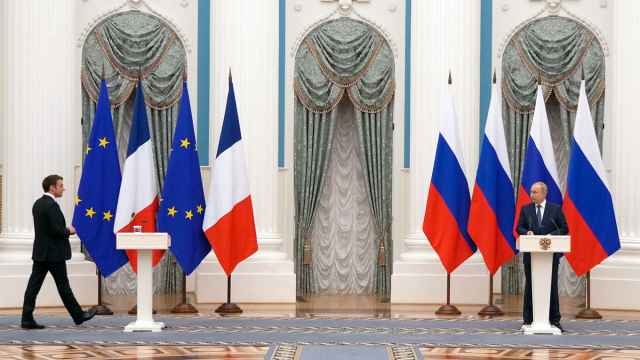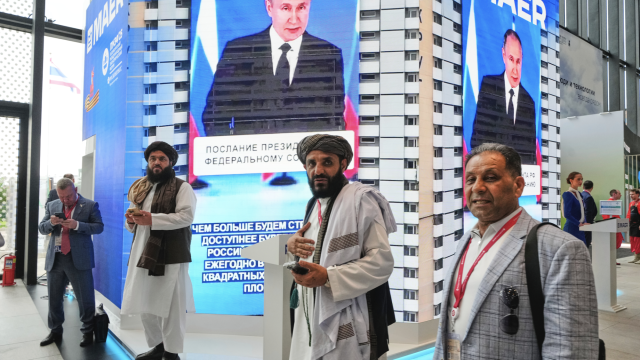Rosneft will not pay a dividend for last year to minority shareholders in TNK-BP, the oil company it bought earlier this year, in another blow to investor confidence in Russia.
Minority shareholders own around 5 percent of TNK-BP Holding, which was acquired by Rosneft along with its parent, TNK-BP, in a $55 billion deal to create the world's largest publicly traded oil company by output.
The minority shareholders had received generous dividends under TNK-BP's previous owners — BP and a consortium of Soviet-born billionaires. Portfolio investors were attracted to the company's small free float by a double-digit dividend yield.
But Rosneft said Thursday that its dividend policy could only be extended to TNK-BP from the closing of the acquisition, which was on March 21.
Rosneft CEO Igor Sechin, a close ally of President Vladimir Putin, has said Rosneft is not "a charity fund,” has no obligation to TNK-BP Holding's minorities and would not offer to buy them out.
The harsh treatment of minority shareholders has damaged investors' confidence in the Russian stock market, which trades at a valuation discount of around half to other emerging markets in part due to weak corporate governance.
"Of course it's not a good decision; shareholders were expecting profits to be paid. It's a very bad sign for the Russian investment climate," one minority shareholder said.
It has also raised concerns about the position of BP, the British oil major, which sold its one-half stake in TNK-BP in a cash and stock deal that left it holding a stake of nearly 20 percent in Rosneft.
TNK-BP Holding's shares, down by over 30 percent since the start of the year, fell by as much as 8 percent before recovering to trade 2.4 percent lower in a flat overall market.
But in a sign that minorities, which include Franklin Templeton's emerging markets group, could get payouts in future, Rosneft also said it planned to create a special committee to work with them.
"Rosneft decisions relating to TNK-BP Holding dividend policy will be announced after the issue is considered by the TNK-BP Holding minority shareholders committee that is being established," it said.
The committee, to be chaired by vice presidents Svyatoslav Slavinsky and Igor Maidannik, will discuss the issue after TNK-BP Holding's annual general meeting on June 27.
Based on TNK-BP Holding's current market capitalization of $19.8 billion, buying out minorities would cost Rosneft around $1 billion.
Investors would be happy to be bought out but also to be paid a dividend.
"It would be a good outcome and also a good thing for Russia; it's not a big deal for Rosneft," one portfolio manager at a large foreign fund said, referring to a buyout. "But if we are paid 25 percent of Rosneft's profit in dividends, we would be happy too."
Last month, Rosneft's board proposed paying 25 percent of its net profit under international standards in 2012 dividends, or 85.3 billion rubles ($2.7 billion) in total, in line with a minimum payout ratio required for state firms.
But instead of returning cash accumulated by TNK-BP during last year's takeover talks through a dividend, Rosneft opted to borrow $9.7 billion for five years in the form of inter-company loans, leaving TNK-BP minorities empty-handed.
A Message from The Moscow Times:
Dear readers,
We are facing unprecedented challenges. Russia's Prosecutor General's Office has designated The Moscow Times as an "undesirable" organization, criminalizing our work and putting our staff at risk of prosecution. This follows our earlier unjust labeling as a "foreign agent."
These actions are direct attempts to silence independent journalism in Russia. The authorities claim our work "discredits the decisions of the Russian leadership." We see things differently: we strive to provide accurate, unbiased reporting on Russia.
We, the journalists of The Moscow Times, refuse to be silenced. But to continue our work, we need your help.
Your support, no matter how small, makes a world of difference. If you can, please support us monthly starting from just $2. It's quick to set up, and every contribution makes a significant impact.
By supporting The Moscow Times, you're defending open, independent journalism in the face of repression. Thank you for standing with us.
Remind me later.





